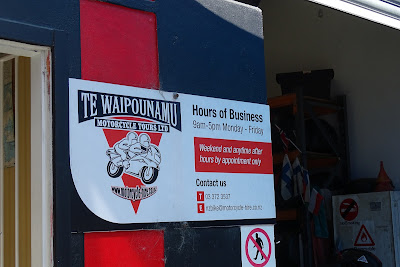NZ9
Maori Dinner on Day 1
 |
| We Were Bused From the Hotel to the Hangi |
The
dinner was called a Hangi (a
traditional Maori feast).
 |
| Our Guide and Our Dinner |
 |
| It Was a Good Meal |
 |
| A Thick, Creamy Soup |
 |
| The Bust of a Villager |
 |
| A Maori Hut |
Before
the dinner was served, we were all invited to look around the ‘village’. We, I
mean all 400 or so guests in smaller groups, received a guided walk around the
property. It’s a beautiful spot.
It’s a beautiful venue when you just look at
what nature offers, but the green plastic tents with the large flip up sides,
the tables and chairs for hundreds of tourists makes the dinner a: business?
 |
| Entrance to the Village |
Yes,
we saw tattooed guys and girls who showed us how they used to dance, what games
they played, how they practiced their fighting, what weapons and instruments
they used, etc.
Paddling a Canoe
The
Maori group danced, sang and even paddled a canoe down the river. By the way,
this river had its spring, its start right on the property. It was an amazing
site to see how
the water rushed out of the ground so fast that it could feed
the stream the canoe rode on. So much water pouring out at once is hard to
believe, but I saw it, it’s like a river started ‘instantly’… just great.
We
had a Maori guide for the evening. He was a personable chap with an easy smile.
He knew his particulars and I would have loved to talk to him on a one to one
basis, but this was a large tour, there was no time for anything like that.
The
general picture I had after this Maori show, my first meeting with a Maori, was
of a people who lived historically off the land. They used what the land had to
offer and had a complicated set of social lives and it became obvious that family
is the most important part of their existence. Not so different from other people
in the world but of course, totally different from anything I had seen before,
except maybe during my visits to the Polynesian Islands, etc. It was also clear
that the men were good warriors, especially in close or hand to hand combat.
Beautiful Voices
Fierce Even the Women
The most outstanding, immediate impressions were the tattoos and or the moko, the facial tattoos. Even the women had tattoos around the mouth, which made me stare a bit when I looked at them. Not nice on my end but I do not see many folks with such body decorations and it piqued my curiosity. I am kind of used to body tattoos; I see a lot of them in today’s day and age, but facial tattoos (moko) are a bit more, what word can I use? - Radical?
As
far as personalities are concerned, the few Maori I met were just nice folks.
They had their job, like all of us and worked in their various professions. I
understand that the North Island of NZ is heavily Maori occupied, but to me
they just look like ordinary people, albeit most of them are a bit heavy. Their
genes are not used to eating today’s sugary food, so they gain weight by eating
the diet we eat today. The history of the Maori, the passing along
of information
from ancestors, was always an oral history. Stories were told to children who
then later told those stories to their children, etc. It was one family with
stories, another family with similar or slightly different stories that all
ended up to be the culture of the Maori today.
 |
| Elaborate Moko |
What
is amazing, important really, is that before the year 1250 AD or so, there were
no people on NZ. No, there were no animals, no four legged animals at all on NZ.
The animals we see today on NZ were all brought to the land by either the Maori
or the later European settlers.
NZ
has native birds, lots of birds, one bird especially was very large, the Moa bird (like a large ostrich). It was huge in fact, up to 12 feet tall. Not
being among humans though, these birds were not afraid of the early Maori settlers
so they were easy prey and provided lots of food to the needy first Maori
settlers. Over-hunting made them extinct rather quickly during the first
centuries after the Maori settled around 1250 AD.
About
70% of the Maori (People of the Four Winds), are urban people today.
Historically there were about 40 distinctly different tribes, but today the
tribes are heavily intermixed.
But
I leaned all of this by reading; the motorcycle tour did not give us any info
on the history of NZ, nor particulars on its native people. Riding, eating and
drinking was the main focus of this trip with Fred.







